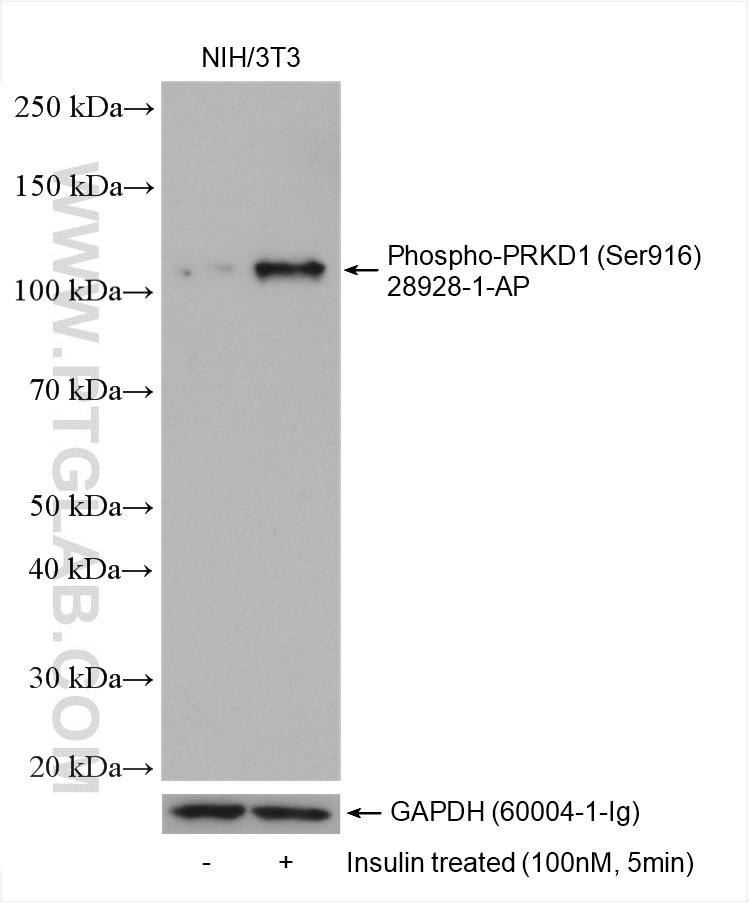Phospho-PRKD1 (Ser916) Polyklonaler Antikörper
Phospho-PRKD1 (Ser916) Polyklonal Antikörper für WB, ELISA
Wirt / Isotyp
Kaninchen / IgG
Getestete Reaktivität
human, Maus und mehr (1)
Anwendung
WB, ELISA
Konjugation
Unkonjugiert
Kat-Nr. : 28928-1-AP
Synonyme
Geprüfte Anwendungen
| Erfolgreiche Detektion in WB | mit Insulin behandelte NIH/3T3-Zellen |
Empfohlene Verdünnung
| Anwendung | Verdünnung |
|---|---|
| Western Blot (WB) | WB : 1:500-1:2000 |
| It is recommended that this reagent should be titrated in each testing system to obtain optimal results. | |
| Sample-dependent, check data in validation data gallery | |
Veröffentlichte Anwendungen
| WB | See 2 publications below |
Produktinformation
28928-1-AP bindet in WB, ELISA Phospho-PRKD1 (Ser916) und zeigt Reaktivität mit human, Maus
| Getestete Reaktivität | human, Maus |
| In Publikationen genannte Reaktivität | Ratte |
| Wirt / Isotyp | Kaninchen / IgG |
| Klonalität | Polyklonal |
| Typ | Antikörper |
| Immunogen | Peptid |
| Vollständiger Name | protein kinase D1 |
| Berechnetes Molekulargewicht | 102 kDa |
| Beobachtetes Molekulargewicht | 110 kDa |
| GenBank-Zugangsnummer | NM_001330069 |
| Gene symbol | PRKD1 |
| Gene ID (NCBI) | 5587 |
| Konjugation | Unkonjugiert |
| Form | Liquid |
| Reinigungsmethode | Antigen-Affinitätsreinigung |
| Lagerungspuffer | PBS with 0.02% sodium azide, 50% glycerol, and 0.05% BSA |
| Lagerungsbedingungen | Bei -20°C lagern. Nach dem Versand ein Jahr lang stabil Aliquotieren ist bei -20oC Lagerung nicht notwendig. 20ul Größen enthalten 0,1% BSA. |
Hintergrundinformationen
Protein kinase D1 (PRKD1), also named as PKD1 and PKCμ, is comprised of two cysteine-rich domains and a pleckstrin homology (PH) domain. PKD1 is involved in cellular processes including protein secretion, proliferation, cytoskeletal reorganization, Golgi function, immune function and apoptosis. It is widely expressed in thyroid, brain, heart, lung and other tissues. PKCs have been shown to regulate PKD1 activation. It has been reported that ser 916 is a PKD1 autophosphorylation site. PKD1 can be activated by growth factors, oxidative stress, thrombin, bioactive lipids, cross-linking of B- and T-cell receptors and some G-protein coupled receptors (GPCR). PKD1 is located mainly in the cytoplasm in unstimulated cells, while PKD1 migrates to the membrane in activated cells. (PMID: 17306383, 24806360, 30101477, 21696630)
Protokolle
| PRODUKTSPEZIFISCHE PROTOKOLLE | |
|---|---|
| WB protocol for Phospho-PRKD1 (Ser916) antibody 28928-1-AP | Protokoll herunterladen |
| STANDARD-PROTOKOLLE | |
|---|---|
| Klicken Sie hier, um unsere Standardprotokolle anzuzeigen |
Publikationen
| Species | Application | Title |
|---|---|---|
Food Chem Toxicol G-Rh4 improves pancreatic β-cells dysfunction in vivo and in vitro by increased expression of Nrf2 and its target genes. | ||
Biochem Biophys Res Commun Protein kinase D1 promotes the survival of random-pattern skin flaps in rats |


